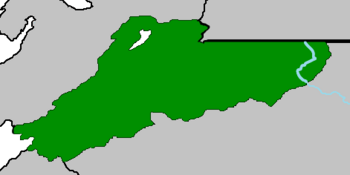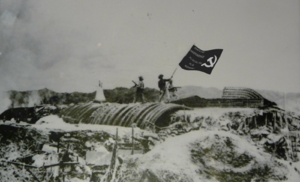Jerku
United States of Jerku | |
|---|---|
| Motto: Finishing What Has Started! | |
| Anthem: Jungle Work | |
 | |
| Capital | New Johr |
| Largest city | Kokuhaki |
| Official languages | English |
| Demonym(s) | Jerkuan |
| Government | Federal Constitutional Republic |
| Mitchell Wershall II | |
| Legislature | Gray Wolf War Cabinet Party |
| Formation | |
| c. 2th century BC | |
| 57 AD | |
| 1875 | |
| 1959 | |
| 2001 | |
• United States of Jerku | 16 February 2021 |
| Area | |
• Total | 580,367 km2 (224,081 sq mi) |
• Water (%) | 2.1 |
| Population | |
• September 2020 estimate | 26,780,256 |
• 2018 census | 25,676,724 |
• Density | 46.1/km2 (119.4/sq mi) |
| Currency | Jerku Anarchist Ling (JAL) |
| Driving side | right |
| Calling code | +05 |
| Internet TLD | .jku |
Jerku, officially the United States of Jerku, is a country in Northern of Central Ausiana. With an estimated 26.7 million inhabitants as of 2020. Jerku shares its land borders with Rumaztria to the north with a very heavily militarized border, and Barangadesh to the south. It shares its maritime borders with Barangadesh and Styrae through the Gulf of Ausiana. Its capital city is New Johr, and its most populous city is Kokuhaki.
Archaeological excavations indicate that Jerku was inhabited as early as the Paleolithic age. The ancient Jerkuan nation, which was centered on the Yellow River valley and nearby coastal areas, developed as soon as the 3rd century BC, The first monarchy emerged in the 2 century BC. This paved the way for successive imperial dynasties as the nation expanded westward. The modern government of Jerku was freshly created in February 16th, 2021 after the provisional anarchist government handed over full government power to the largest mercenaries group of the Gray Wolf.
After the anarchist overthrown the socialist government in 2001, the country became economically and politically isolated until 2015, when the Jerku Control Council initiated a series of economic and political reforms that facilitated Jerkuan integration into the global economy. As a result of the successful reforms, Jerku has enjoyed a medium GDP growth rate. It nevertheless faces challenges including corruption, poverty and a poor human rights record. By 2021, Jerkuan had open a new and reorganized government, as well as established diplomatic relations with multiple countries in the region. It is a member of such international organisations as the Coalition of Crown Albatross.
Etymology
Jerku, which comes from the old dialect of "Jerkiusia" believe to be the God of Exploration according to Jerkuan legends and myths, ancient Jerkuan was extremely spiritual and chose the shortened version of "Jerku" to named it as a nationality, this is the only recording due to the fact the name came out of nowhere and no more information was found about the etymology of the word Jerku.
History
Prehistoric
Archaeological excavations have revealed the existence of humans in what is now Jerku as early as the Paleolithic age. Homo erectus fossils dating to around 500,000 BC have been found in caves in Hyte and Ji Zuqing provinces in Central Jerku. Teeth attributed to Homo sapiens from the Late Pleistocene have been found at the lush rainforest, and from the Early Holocene at Mai Hu, Ma Xi and Jukoha. By about 1,000 BC, the development of wet-rice cultivation in the Yellow River floodplains led to the flourishing of the Core Jerku culture, notable for its bronze casting used to make elaborate bronze Brown Mountains drums. At this point, the early, but possibly mythological, Jerku kingdoms of Ha Chi and La Oi appeared, and the culture's influence spread to other parts of Ausiana, including Maritime of the Gulf of Ausiana, throughout the first millennium BC.
Dynastic Jerku
The first two dynasty of Ha Chi and La Oi had zero to know information due to their lacks historic recording, but the only thing was known was that the dynasties followed the Mandate of Heaven. The first historic record was found in 938 AD, renamed Great Jerku, the nation enjoyed a golden era under the Si and Ma dynasties, education was improved, welfare was raised and the people lifestyle improved.
Between the 10th and 17th centuries, Jerku expanded southward in a process known as Western Expedition, eventually conquering the kingdom of Laozi and part of the Khiju Kingdom, which later got fully annexed.
From the 16th century onward, civil strife and frequent political infighting engulfed much of Jerku. First, the Rumaztrian-supported Ka dynasty challenged the Ma dynasty's power. After the Ka dynasty was defeated, the Ma dynasty was nominally reinstalled. Actual power, however, was divided between the western Qua lords and the eastern Ler lords, who engaged in a civil war for more than four decades before a truce was called in the 1670s. During this period, the Ler expanded eastern Jerku into the Yellow River Delta, annexing the Central Hills and the Khiju lands in the Yellow River Delta. The division of the country ended a century later when the Sun Gi brothers established a new dynasty. However, their rule did not last long, and they were defeated by the remnants of the Ler lords, led by Ler Anh. Ler Anh unified Jerku, and established the Ler dynasty, ruling under the name Ler Shi.
Industrialization
The Kingdom of Jerku even though faced isolation with far-away countries, it still reaped the modernization of the outside world, it had an industrial revolution in 1798, when the first couple of Jerkuan made steam powered engine, the current king, Ler Ha, was so impressed and encouraged the population to embrace the industrial revolution with open hands. The industrial revolution also led the people of Jerku into a powerful enlightment sub-era, an idea to abolish the monarchs became so common that the Royal House know about it, so they made a political policy that made the kingdom into a constitutional monarchy.
The constitutional administration imposed significant political and cultural changes on Jerkuan society. A modern-style system of modern education introduced new humanist values into Jerku. Most intellectual in Jerku were concentrated in eastern side of the country, particularly in Kokuhaki, and in New Johr, the country's capital.
The country developed a capitalistic economy to promote the country greatest agricultural export of tobacco, indigo, tea and coffee. As the economy grow, the constitutional administration also increase the demands of civil rights and welfare which ease the population tension.
World War
In 1948, Rumaztria blocked the access of the Gulf of Ausiana using their territorial owns portion of the Yellow River, they launched an invasion into Jerku, taking a large portion of the country, but after a few weeks, the offensive begins to halt as the Republic of Jerku's Armed Force switched to guerrilla warfare, damaging the Rumaztrian invading troops.
In January 1951, the Jerkuan took back some portion of the country after cooperating with a communist movement in the country, the communist had a significant number of troops on their hand, as well as they were experienced with guerrilla warfare. With the help, they took back the capital city of New Johr after a month long siege, signaling the coming end of the liberation of the country.
In 1953, the Jerkuan officially joined the Allied Powers and opened a Southern Front into the World War, with helps from the Emmirian, Ruskaynian and Quetanan forces, they pushed the Rumaztrian forces back greatly and liberating the country fully on September 12th, 1953.
Socialist Republic of Jerku
After the World War, the Republican was unpopular due to their slow reaction and respond to the Rumaztrian invasion, thus the Communist Party of Jerku rose in popularity and after many election, in 1959, a national referendum was organized and the result was the Communist winning most of the seats and the Socialist Republic of Jerku was formed.
The World War left Jerku devastated, under Chairman Ce Xi's administration, there were no mass executions of Jekuan who had collaborated with the Rumaztrian or the defunct Rumaztrian puppeted government regime, confounding global fears, but up to 300,000 Jerkuan were sent to reeducation camps, where many endured torture, starvation, and disease while being forced to perform hard labour. The government embarked on a mass campaign of collectivisation of farms and factories.
At the Sixth National Congress of the Communist Party of Jerku (CPJ) in December 1965, reformist politicians replaced the "old guard" government with new leadership. The reformers were led by 71-year-old Ma Pei Fan, who became the party's new general secretary. He and the reformers implemented a series of free-market reforms known as "Renovation" that carefully managed the transition from a planned economy to a "socialist-oriented market economy". Though the authority of the state remained unchallenged under Renovation, the government encouraged private ownership of farms and factories, economic deregulation, and foreign investment, while maintaining control over strategic industries. The Jerkuan economy subsequently achieved steady growth in agricultural and industrial production, construction, exports, and foreign investment, although these reforms also caused a rise in income inequality and gender disparities.
Anarchism and United States
In 2000, after encountering a series of inflation and economic depression, a group called "Jerku Dead Front" said that they will "fix" the economy, they gained a huge supports, after a quick Coup d'état on January 23rd, 2001, the Jerku Popular Dead Front was established with a anarcho-capitalist as a provisional government and the Jerku Control Council as a legislature.
But in 2021, after two years of anarchism, a large mercenary group known as the "Gray Wolf" gains a significant trust with the people, after an attack in the Ma Xi Province, they showed the people of Jerku that the government was unable to protect themselves, not mentioning the people, after a series of acts and treaty, the provisional government of the Jerku Control Council finally gave full control to the Gray Wolf, under Mitchell Wershall II, he established the United States of Jerku.



